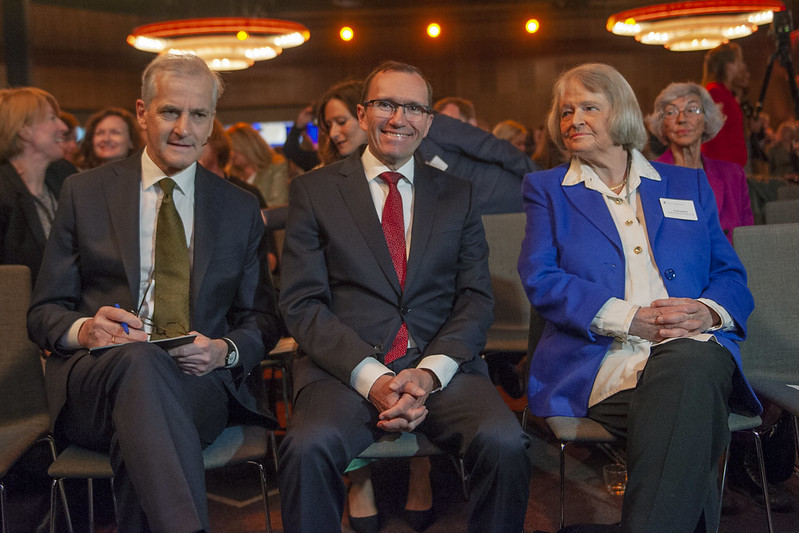Despite all the gas and oil money pouring into Norwegian coffers (or perhaps because of it), Norway hasn’t invested enough of it in alternative energy to help meet its climate goals, and probably won’t by 2030 either. Commentators point to how government politicians “fail to deliver” what’s needed, local politicians still prefer economic development to nature preservation, and a majority refuse to even start phasing out Norway’s highly lucrative oil and gas industry.

“The idea of a well-oiled green shift appears more of a pipe dream than ever,” wrote commentator Eva Grinde in newspaper Dagens Næringsliv (DN) this week. She points to how the current Labour Party-led government’s stated policy is to “develop, not phase out” Norway’s oil and gas industry. There’s simply too much money at stake.
The oil business itself appears confident it can continue searching for and producing more oil and gas for years to come, even though several international organizations warn they shouldn’t be allowed to if global climate goals are to be met. A recent survey of member companies in the trade association Offshore Norge showed that fully two-thirds of fossil-fuel firms don’t expect any major restructuring away from current activities as a result of climate concerns. While the car- and boat businesses are preparing for more change tied to electrification, it will be mostly business as usual in the oil branch.
“That must be seen in connection with how the question applied to the next seven to 10 years, and that the government has its policy of developing, not phasing out the petroleum business,” wrote the Nordic Institute for Studies of Innovation, Research and Education (NIFU) in its latest “confidence barometer” report to Norwegian employers’ organization NHO.

“It’s no surprise that the oil and gas business expects to keep pumping as before,” wrote Grinde. Tax incentives have prompted major new investments on the Norwegian Continental Shelf, more than ever in 2022, according to Oslo-based Rystad Energy. There’s a political intention to use offshore competence to develop alternative energy projects such as offshore wind, but state oil company Equinor’s boss thinks such projects have become too expensive lately, even though his own hugely profitable company could seem to afford them. Most of Equinor’s record profits are being paid out in dividends to shareholders, which include the state.
While the international climate panel IPCC thinks all new oil projects should be stopped, in order to meet climate goals, Rystad Energy claims Norwegian gas can help reduce global emissions by replacing coal. Norwegian Broadcasting (NRK) reported how Rystad’s new analysis (commissioned by the government’s oil ministry) was promptly bashed by Norwegian environmental organizations. “The conclusion that Norwegian oil and gas are good for the climate is completely absurd,” Truls Gulowsen of Norway’s chapter of Friends of the Earth (Naturvernforbund) told NRK.
Norwegian politicians on both the left and right embraced the report, however, proving how Norway’s two “steering” parties (Labour and the Conservatives) fully agree on oil and gas policy and don’t want to curb production. Their staunch support for the Norwegian offshore industry is shared by the Center Party (Labour’s partner in their current minority government) and the right-wing Progress Party (which was the Conservatives’ partner in the former government).

Professor Jan Emblemsvåg at NTNU in Trondheim wrote in a commentary in newspaper Dagsavisen this week that Labour and the Conservatives thus have “a special responsibility” to cooperate on climate policy and deliver on their UN sustainability goals. In a report delivered to the leaders of both parties, Emblemsvåg and strategic adviser Jørgen MB Grønneberg urge Prime Minister Jonas Gahr Støre and his predecessor, Conservatives leader Erna Solberg, “to form joint climate policy that will stand regardless of who holds government power.”
Climate change remains the world’s greatest challenge, they argue, and emissions must be cut regardless of who’s in charge. The politicians’ track record so far is poor: The former goal of a 30 percent reduction between 2010 and 2020 amounted to just 4.2 percent, Emblemsvåg and Grønneberg note. The goal of a 55 percent reduction by 2030 is expected to end up at less than half that. Equinor’s boss has stated, meanwhile, that his company intends to keep on producing and expanding beyond earlier limits from 2030.
Nature preservation is the world’s other major challenge, with Norway supporting protection of 30 percent of the planet’s land area but not necessarily within Norway. Not only has the government itself approved another wolf hunt and a motorway through a nature preserve, Dagsavisen has reported how local mayors resist preservation in their municipalities. From Kautokeino and Tana in the north to popular holiday destinations in the south, there’s little political willingness to protect wilderness areas, even if financial compensation from the state is offered.
“The path to climate hell is paved with good intentions,” wrote Stian Bromark, editor of Agenda magazine last fall. Norway has long boasted of its stunning scenery, made a big point of mounting a “green” Olympics as early as 1994 and generally promoted an image of being environmentally conscious while also producing oil. The huge wealth created by oil and gas makes it difficult to turn off the pumps. All the so-called “climate budgets,” emissions cuts demanded from the public and renewed support for rain forests in Brazil and Indonesia won’t offset emissions created by Norway’s own production of oil and its use after it’s exported.
Tycoon Bill Gates was in Norway this week and spoke at yet another conference on energy and climate issues. Not only politicians are reluctant to make the sacrifices necessary to meet climate goals: Gates noted how voters “won’t pay the price. Everyone is for energy restructuring, but no one wants to be poorer.”
That includes Norway. Prime Minister Støre, who attended the Oslo Energy Forum and had another meeting with Gates, had to agree. “Bill Gates is right when he says that if we (try to meet climate goals) with a whip, it can boomerang and lead to a backslide,” Støre told DN. “People need to get to work, they want various products, it just has to be done in a balanced manner.” And, given his government’s policy, in a manner that can still let Norway keep its gas and oil flowing.
newsinenglish.no/Nina Berglund

